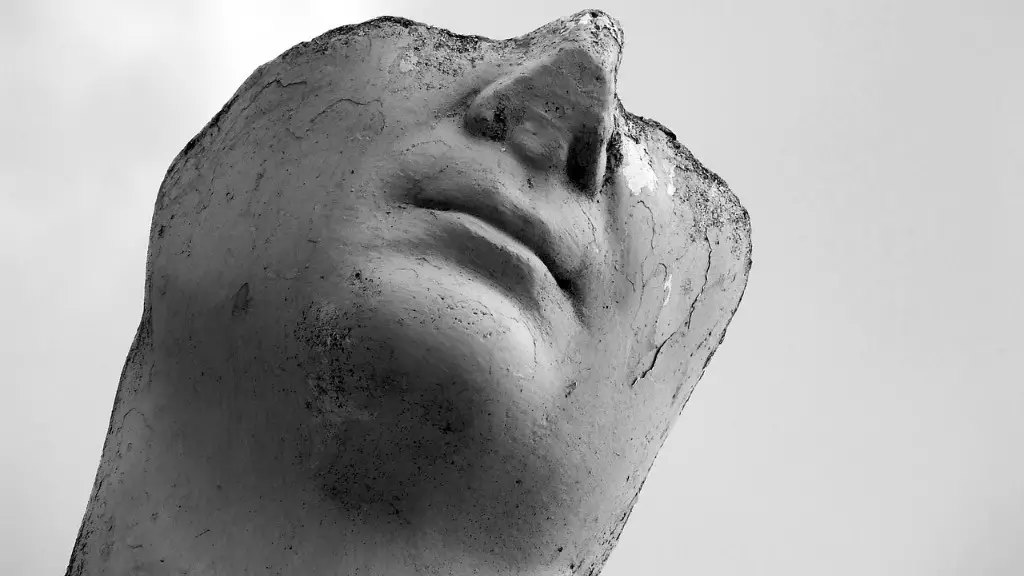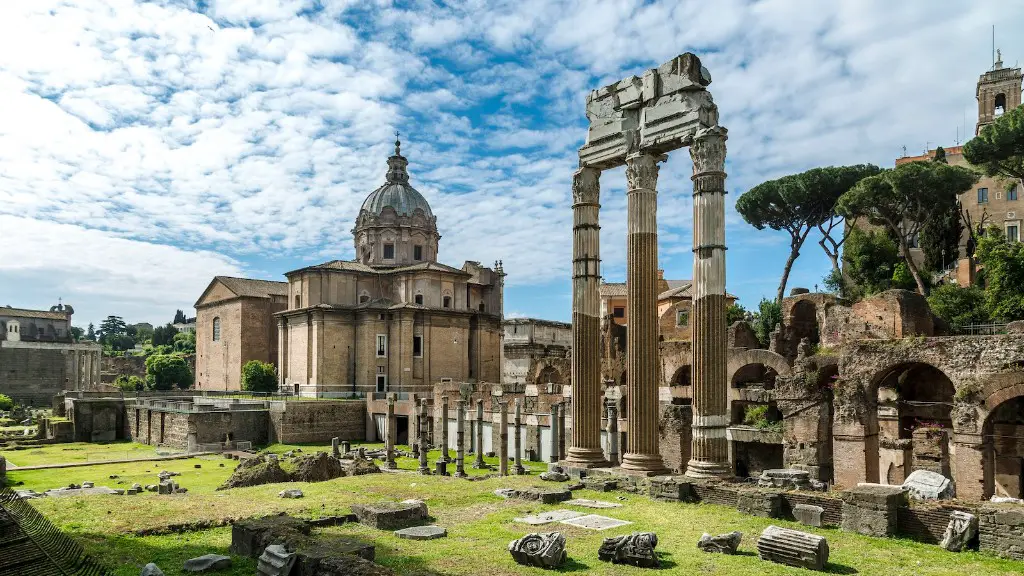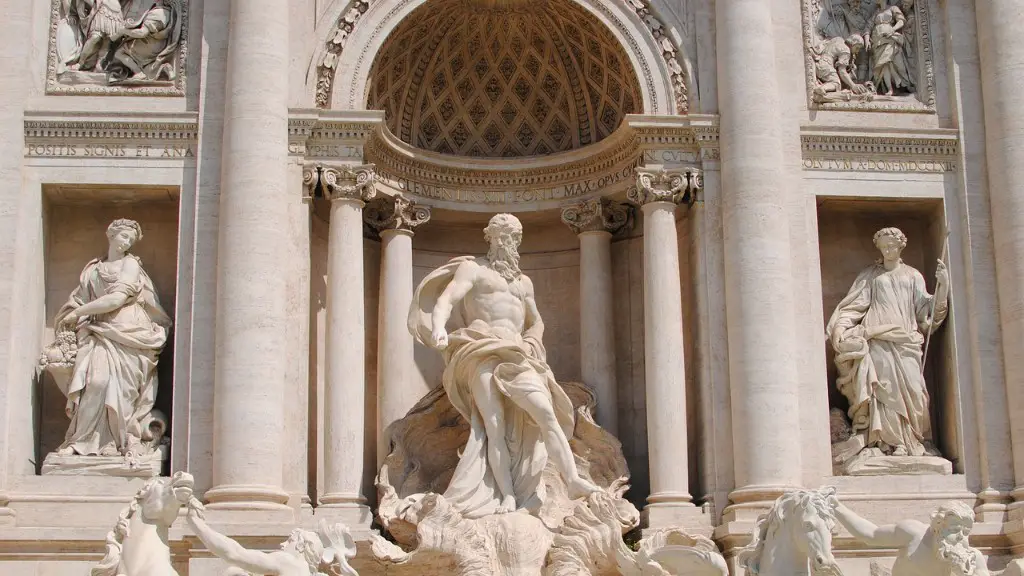The term ‘triumvirate’ is derived from Latin meaning ‘the three men’. It was a form of government used in Ancient Rome that involved three men ruling together. It was established during the End of the Roman Republic, the period known as the Age of the Tetrarchy. Additionally, the triumvirate can be defined as “a group of three powerful individuals or countries who cooperate and share responsibilities”.
The most famous triumvirate in Ancient Rome was Julius Caesar, Marcus Crassus and Pompey the Great. In 60 B.C. these three men formed the First Triumvirate to share power in the Roman Republic. Caesar was a military genius, leader of the Populist party and an ambitious reformer. Crassus was a wealthy merchant prince who had used his money to gain political influence. Finally, Pompey was the most powerful military commander of the time and was popularly known as “the Great”. The First Triumvirate granted power to the three men to outmaneuver the Senate and gain control of the Roman Republic during the 60s B.C.
The triumvirate sought to restore order in the Roman Republic by making land reform, changing the tax system, restoring the economy, and setting in place a new legal system. However, Caesar was the most powerful of them and his ambition quickly led to conflict with Pompey and Crassus as each man tried to gain power for himself. In 45 B.C., the Roman Senate declared Julius Caesar dictator of Rome, ending the triumvirate. This lead to the end of the Republic and the beginning of the Roman Empire.
The triumvirate was thus a power-sharing arrangement that limited the power of any one man in the Roman Republic. It was seen as a way of balancing the interests of the Senate, the armies and the people, thereby preserving the peace and stability of the Republic. It is often used as an example of how government can work together to promote the interests of all its citizens.
The triumvirate was not a perfect system, and its downfall ultimately led to the collapse of the Roman Republic and the rise of the Roman Empire. Nevertheless, it is an interesting part of Ancient Roman history that has been widely studied by historians and scholars. For example, some scholars have argued that the triumvirate was a successful form of government and was better than any one of the three men attempting to gain absolute power.
Moreover, the triumvirate can still be seen in modern politics, with some governments forming coalitions or alliances between different political parties to share power and influence. While this may not always be successful, it can still be seen as a way of balancing the interests of multiple parties, thereby preventing any one party from gaining too much power.
Triumvirate and Roman Political System
The triumvirate brought a degree of stability to Rome, as the three leaders shared power and responsibility. For example, each man was able to check and balance the power of the other, restraining any one of them from becoming too powerful. They also shared the common goal of restoring order to the Roman Republic and thus united their efforts towards this aim.
The triumvirate, however, did not completely resolve the political discord in Rome, as conflicts still arose between the Senate and the two consuls (Caesar and Pompey). This ultimately led to the dissolution of the triumvirate and the establishment of the Roman Empire. Nevertheless, the triumvirate did succeed in restoring some order to the Republic, and it is clear that it had a lasting effect on Rome’s political system.
Moreover, the triumvirate had a long-lasting influence on Rome’s political institutions. For example, it helped to establish the concept of a coalition government, in which multiple parties or individuals could share power. This concept has been adopted in many modern democracies, and some have argued that it has even helped to preserve peace and stability in certain countries.
Finally, the triumvirate was a key stepping stone in Rome’s transition from a republic to an empire. By eliminating the potential for a single leader to become too powerful, it helped to ensure that no one individual would successfully take control of the entire Roman state. This consequently allowed the transition to the imperial system to take place peacefully.
Legacy of the Triumvirate
The triumvirate has left a lasting legacy in both Ancient and modern society. Its influence can be seen in modern politics, with many governments employing similar power-sharing arrangements in order to balance the interests of different groups within a state. It is also seen as a means of preventing any one party or individual from gaining too much power.
In addition, the triumvirate is also recognized for its role in allowing Rome to transition from a republic to an empire. Without a system that could prevent one individual from gaining absolute power, it is likely that the transition to an imperial system would not have been possible in the peaceful manner in which it occurred.
Furthermore, the triumvirate has also been praised for its success in restoring order to the Republic. By balancing the power between the three leaders, it prevented any one individual from becoming too powerful and maintained a degree of stability in the state.
Finally, the triumvirate is a major part of Ancient Roman history, and it has been widely studied by historians and scholars. For many of these experts, the triumvirate is an example of how government can work together in order to promote the interests of all of its citizens.
Conclusion
The triumvirate was a form of government employed in Ancient Rome that involved three men ruling together. It was established during the End of the Roman Republic and was seen as a way of balancing the interests of the Senate, the armies and the people. The most famous triumvirate was Julius Caesar, Marcus Crassus and Pompey the Great, who sought to restore order in the Roman Republic by making land reform, changing the tax system, restoring the economy, and setting in place a new legal system.
The triumvirate has left a lasting legacy in both Ancient and modern society. Its influence can be seen in modern politics, and it is also recognized for its role in allowing Rome to transition from a republic to an empire. Moreover, the triumvirate has also been praised for its success in restoring order to the Republic.




